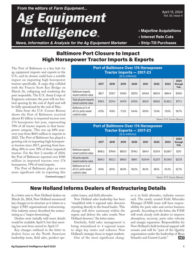By Farm Policy Facts*
America’s farmers have found themselves on the front lines of an ongoing trade war, but recent news on three major trade fronts has farmers across the heartland cautiously optimistic.
The Trump Administration recently announced that they have reached an agreement in principle on a trade agreement with Japan, with a final agreement expected to be signed during the United Nations General Assembly meeting later this month.
Finalizing a trade agreement with Japan could secure valuable market access for several American commodities and ignite a new momentum for the President’s trade agenda.
Trade attorney John Gilliland joined Groundwork to discuss what this means for agriculture and the status of several other ongoing trade negotiations.
While the details of the tentative agreement with Japan have not yet been publicly released, it may look very similar to the market access and tariff easement the U.S. would have received under the Trans-Pacific Partnership, now known as the Comprehensive and Progressive Agreement for Trans-Pacific Partnership (CPTPP).
The CPTPP took effect in December 2018 and gave several of our competitors, including Australia and New Zealand, preferential access to the Japanese market. A separate trade agreement between Japan and the European Union took effect in February 2019.
A driving objective for both the U.S. and Japan during negotiations has been to “get U.S. farm exports on an equal footing with these other countries,” Gilliland said. “Getting this deal with Japan now is really designed to make sure we don’t lose any further advantages to exports in those countries. With every passing year that goes by we lose that advantage, or have that disadvantage so to speak, it gets that much harder to get that access back.”
Gilliland shared with Groundwork listeners how key commodities such as beef, pork, wheat, dairy and corn will benefit from a completed agreement.
Japan isn’t the only trade negotiation generating interest in rural America. Farmers and ranchers are also asking Congress to pass the U.S.-Mexico-Canada (USMCA) agreement this fall.
“[Passing USMCA] would give us much needed market certainty,” Gilliland said. “With so much else happening in the agriculture sector, not only in our export markets, but here at home, it’s important to know that the access and the markets that we’ve had under NAFTA are going to remain in place.”
And delivering on a trade deal with China that works toward resolving retaliatory tariffs and secures new market access for American agricultural products will be critical for farm country. At the end of the day, American agricultural exports will always be a key component in trade negotiations because our farm products are competitive, have a positive impact on the U.S. economy and food security is tightly bound to national security.
“We are at the center of every one of these negotiations because we matter. And because we matter, I feel confident and optimistic that at the end of the day, these types of agreements, for them to come back to Washington with an agreement, it’s going to have to work for agriculture,” Gilliland said.
Farmers need international markets and we are grateful that Washington has taken a stand to expand export opportunities. It is our hope that trade negotiators can continue forging a positive path forward.
*Farm Policy Facts – a 501(c)(4) non-profit organization – is a coalition of farmers and commodity groups created to educate Members of Congress and Americans about the importance of agriculture and its contribution to a strong and vibrant United States. https://www.farmpolicyfacts.org




Post a comment
Report Abusive Comment